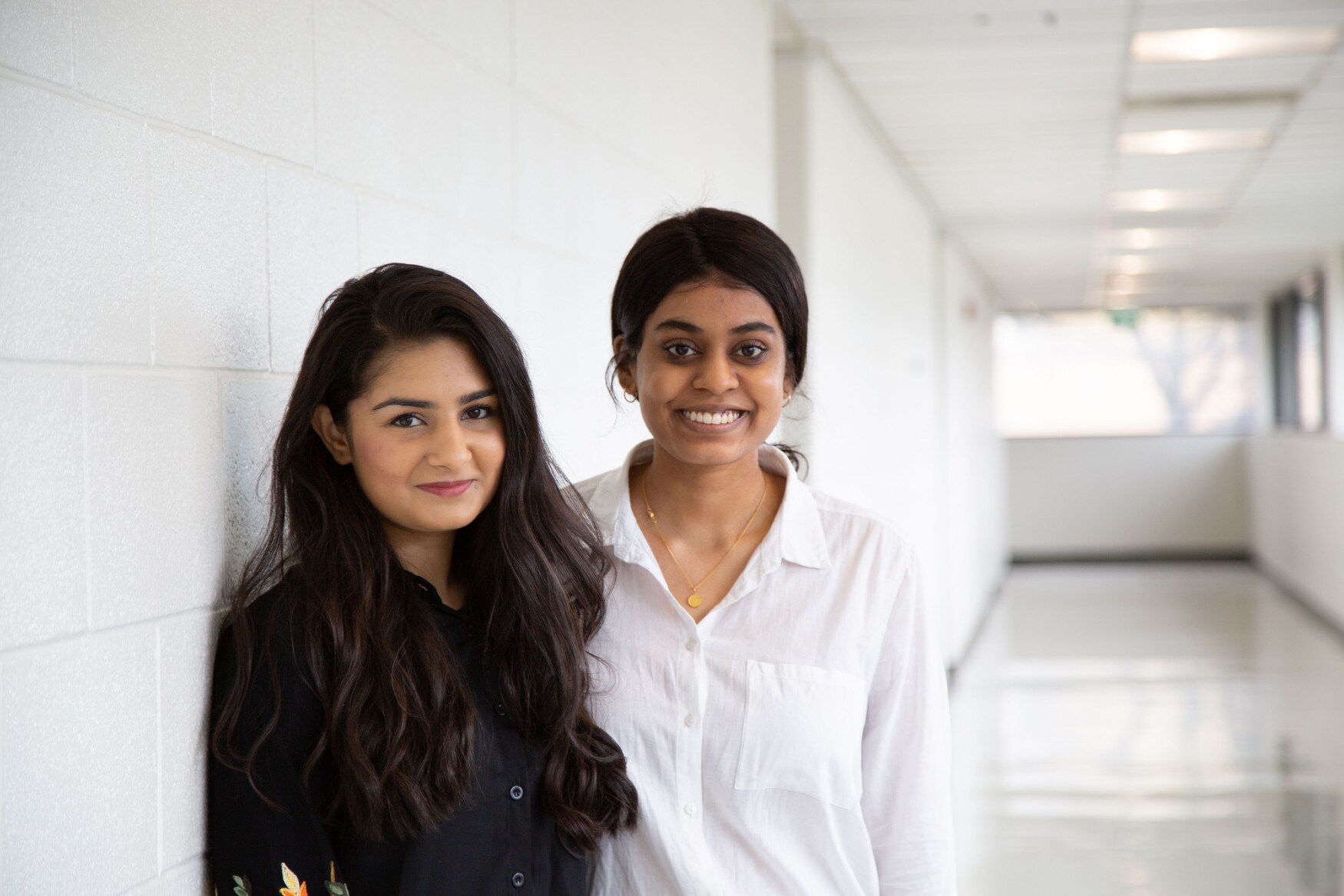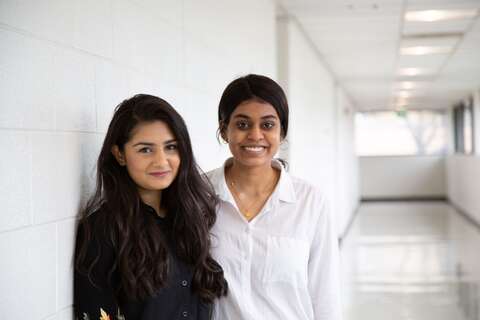Main Second Level Navigation
Faces of U of T Medicine: Maham Bushra and Meera Mahendiran

Julia Soudat

Diversity, inclusion, equity and allyship are at the core of Dear MD to Be, a new podcast created by medical students Maham Bushra and Meera Mahendiran. They spoke to writer Julia Soudat about why it’s important to highlight the beauty of diversity in medicine, the challenges of creating a podcast and the valuable lessons they’ve learned along the way.
What got you interested in medical careers?
Meera: Growing up, I spent most of my summer breaks with my large family. A few of my cousins are afflicted with Muscular Dystrophy and Downs Syndrome. Through early encounters with these illnesses, I became intrigued by the pathology of these disease states and also with the entire patient process. I was fascinated and moved by every triumph, every setback, and every step my cousins and their parents took towards coping with these disorders. Through my family, I learned very early on about the beauty of medicine, an art that not only aims to heal one’s aches and pains, but their deepest fears and worries concerning their illness.
Born and raised in Scarborough, I had many opportunities to cement this belief further as I witnessed several doctors provide holistic care to minority patient populations. I have witnessed the doctor who considers their patient’s cultural needs and social determinants of health. I have witnessed the doctor who’s a good friend, a confidant, and a source of solace. When I realized I could advocate and empower people in a most impactful way, I fell in love with the challenging and rewarding field of medicine. I would say that both my family and community helped me realize I wanted to become a doctor.
Maham: I was always a curious child; my parents joke that I spent a large part of my childhood buried in books, attempting to understand the world around me. As I went through high school and my undergraduate degree, I realized I had broad, subject-spanning interests. I wanted a career that would evolve with me and allow me the flexibility to be an educator, a clinician, a community leader, a researcher; even all of the above.
As an immigrant, I always envisioned working in a profession that would serve populations who have been traditionally and systemically underrepresented in our current institutions. I wanted to address healthcare disparities by supporting community health education initiatives, speaking to health policy makers and encouraging the inclusion of diverse voices in research. I was also drawn to medicine because it is one of few professions that allows us the great privilege to a make difference in people’s lives when they are at their most vulnerable - from welcoming life into the world to providing support at the end of life.
You started a podcast called Dear MD to Be. What’s the podcast about and what made you want to do it?
While medical school is often a time of excitement and joy, it can also present a new challenge, one that creates feelings of self-doubt, uncertainty, and imposter syndrome. For medical students of diverse backgrounds, an added cultural imposter syndrome and feelings of inadequacy can result when we are unable to see those who represent our journeys and unique experiences in our hallways, learning sites, and budding careers. Coming from diverse backgrounds ourselves, we know first-hand how important and relevant these conversations can be.
The podcast features conversations between our medical student co-hosts and physicians who come from diverse backgrounds. New episodes will be released on a monthly basis and available on our website, iTunes and GooglePlay.
Do you work with a team?
Aside from us two, we have four co-hosts, two social media representatives and two audio editors. All of us are either first- or second-year medical students. Our amazing team consists of: Sampreeth Rao, Dion Diep, Aazad Abbas, Kaylee Sohng, Mollie Sivaram & Isra Hussein.
We reached out to medical students interested in topics such as diversity in medicine, inclusion, equity and allyship. Many of our team members bring unique lived experiences and skill sets with them. We have team members who have their own podcasts, others with amazing editing and social media experience, along with some who have been on the radio themselves!
How did you go about picking the themes for each episode?
Our episodes feature conversations with physicians who come from diverse backgrounds and their journeys through medical school and their careers. We want our episodes to reflect current events. For instance, we have an episode coming out soon with Dr. Tehmina Ahmad, who discusses coming from a lower socioeconomic status background and relates this to the recent OSAP changes impacting many students.
What has been the most challenging thing about doing this podcast?
One of the biggest challenges has been trying to understand and master the technical aspects of creating a podcast. Neither of us has worked on a podcast in the past, or any multimedia project for that matter. It was quite a learning curve to acquire the skills to write, host, record, edit, and promote this podcast. However, we have had support from our skilled team, the Diversity Office, Alumni Relations, other podcast creators, and faculty members to overcome these challenges. All of the hurdles we have faced so far have been wonderful opportunities for learning and growth, and we are excited to improve and evolve Dear MD To Be as a result.
Have you learned any valuable lessons along the way?
The most valuable part has been listening to the stories of physicians and residents. Our conversations are an important reminder of the hidden struggles many medical trainees from underrepresented backgrounds face and the systemic barriers that continue to perpetuate this hardship. It has also been very reassuring to see how accepting and encouraging physician leaders have been of our work; the response made us realize that a helping hand is just an email away. Our work with this project has inadvertently resulted in a network of support and mentorship for students, and it is incredibly heartwarming to see this tangible manifestation of our vision.
What do you hope to achieve with the podcast in the long run?
We hope to encourage the practice of celebrating diversity among ourselves, our faculty, and ultimately our patients. Our aim is to showcase how medical trainees can use their diversity as a tool for professional excellence and success. By presenting podcast series that focus on physicians’ personal experiences of coming from an underrepresented background whilst in medical school, we hope to promote the notion that diversity is present, powerful, and advantageous.
In terms of long-term plans, we aim to promote the values and vision of this project in any space that welcomes us. We hope to organize community campaigns and campus-wide events focused on diversity in medicine such as networking events, panel discussions and live podcasting sessions. We are hoping to work with faculty to integrate parts of our message into the medical curriculum through online modules, formal lectures/presentations and physician panels. We also hope the podcast expands beyond just the U of T medical community to reach trainees at other provinces and medical schools across Canada.
With medical school and the podcast, you both have a lot on your plates. What do you like to do in your spare time and what gets you through the challenging times?
Meera: These days, I’m really learning to hit the “Pause” button and take time to recharge when life gets challenging. I enjoy taking time to be reflective and rationalize my situation, taking time to express gratitude even when it may seem hard to do.In my spare time,I enjoy creative writing, being active, and petting all furry animals. I’m also always down for some good food and laughs with my friends and family!
Maham: My parents, siblings and friends are my anchors during difficult times. I am extremely blessed to be surrounded by a tight-knit, supportive network of people who remind me of my roots and inspire me every day with their kindness, selflessness and love. Also, taking some time for self-reflection by going for a run, reading or journaling is always helpful. I also really enjoy cooking with my family.
